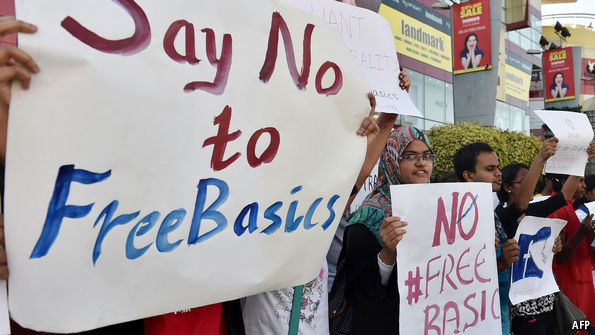
“WHO could possibly be against this?” Mark Zuckerberg, Facebook’s boss, asked in an editorial in the Times of India on December 28th. The “this” in question is “Free Basics”, a programme that gives its users free access to Facebook and a handful of other online services on their smartphones in 36 poor countries. According to Mr Zuckerberg, Free Basics acts as a gateway drug to the internet: half of those who first experience the internet through the service start paying for full internet access within a month. Though the programme is promoted by Facebook, its costs are borne by the mobile-telecoms operators it works with—in the case of India, Reliance Communications, the country’s fourth-largest.
As it turns out, plenty of people are against Free Basics. They include everyone from India’s internet-and-mobile-industry body (of which Facebook is itself a member) to a ragtag group of volunteer activists who mobilised almost 400,000 people to write to the Telecom Regulatory Authority of India (TRAI) as part of a public consultation on whether mobile operators should be allowed to charge different amounts for different forms of data. At stake is one of the world’s largest and fastest-growing internet markets outside China, which bars some foreign digital services such as Facebook from entering. Around a quarter of the Indian population—or 300m people—were online at the end of 2014, and the number is expected to double by 2020.
Critics of the programme say that Facebook’s generosity is a cover for a land-grab. They argue that Free Basics is a walled garden of Facebook-approved content, that it breaches consumer privacy by sucking up all the data generated by users of Free Basics, and that it is anticompetitive to boot. Moreover, critics fear that if new internet users are merely Facebook users, other online businesses will have no choice but to operate within Facebook’s world. Nandan Nilekani, an Indian tech luminary opposed to Free Basics, suggests that, instead, the government subsidises a monthly allowance of free mobile data for each user.
Facebook counters that the programme is open to all-comers that meet certain technical requirements, that user data are stored for only 90 days, and that there is no profit motive: the service does not include advertising. As for suppressing local competition, Facebook argues, “there is no greater threat to local innovation than leaving people offline”. If, as Mr Zuckerberg says, Free Basics users quickly graduate to paying for full internet service, India’s ferociously competitive mobile-telecoms firms should be able to provide it cheaply. And if Free Basics proved popular there would be little to stop India’s big media and e-commerce groups from creating rival offerings, to drive first-time surfers towards their web offerings.
The fight between Facebook and local activists has gone viral in India. Over the past few weeks, Facebook has run an extensive advertising campaign with full-page ads in Indian newspapers touting Free Basics, many of them under the banner of “digital equality”. Newspapers, blogs and television channels have presented arguments and counter-arguments on a daily basis. Even All India Bakchod, a popular comedy collective, got into the act. The group’s video arguing against Free Basics has been watched 800,000 times on YouTube—and another 350,000 on Facebook itself.
Facebook has already suffered setbacks. Activists in India won early victories in 2015, leading Facebook to change the name of its service from internet.org, which they said was misleading, and forcing the company to accept more services than those it handpicks. Their biggest victory came in December, when TRAI suspended Free Basics in India pending the results of its consultation process. TRAI has received 1.4m notes of support for Free Basics as part of this process, driven largely by an automated response tool Facebook used to gather support from its Indian users. But the regulator says it may have to disregard them, since they do not answer the question it is asking. TRAI itself will deliver its verdict at the end of this month.
Facebook counters that the programme is open to all-comers that meet certain technical requirements, that user data are stored for only 90 days, and that there is no profit motive: the service does not include advertising. As for suppressing local competition, Facebook argues, “there is no greater threat to local innovation than leaving people offline”. If, as Mr Zuckerberg says, Free Basics users quickly graduate to paying for full internet service, India’s ferociously competitive mobile-telecoms firms should be able to provide it cheaply. And if Free Basics proved popular there would be little to stop India’s big media and e-commerce groups from creating rival offerings, to drive first-time surfers towards their web offerings.
The fight between Facebook and local activists has gone viral in India. Over the past few weeks, Facebook has run an extensive advertising campaign with full-page ads in Indian newspapers touting Free Basics, many of them under the banner of “digital equality”. Newspapers, blogs and television channels have presented arguments and counter-arguments on a daily basis. Even All India Bakchod, a popular comedy collective, got into the act. The group’s video arguing against Free Basics has been watched 800,000 times on YouTube—and another 350,000 on Facebook itself.
Facebook has already suffered setbacks. Activists in India won early victories in 2015, leading Facebook to change the name of its service from internet.org, which they said was misleading, and forcing the company to accept more services than those it handpicks. Their biggest victory came in December, when TRAI suspended Free Basics in India pending the results of its consultation process. TRAI has received 1.4m notes of support for Free Basics as part of this process, driven largely by an automated response tool Facebook used to gather support from its Indian users. But the regulator says it may have to disregard them, since they do not answer the question it is asking. TRAI itself will deliver its verdict at the end of this month.
-->
0 Response to "Facebook, Telecom Regulatory Authority of India"
Post a Comment